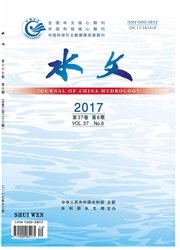

 中文摘要:
中文摘要:
根据流域内气象站、雨量站、水文站的气温、降水、径流系列监测资料,采用周期波法、延时分布频率、径流溯源理论分析了渭河流域气温变化及分布特征,降水量变化及分布特征。径流变化特征和未来变化趋势。揭示了渭河流域气温、降水和径流变化之间的关系。结果表明:(1)气温波动变化存在着9~10a的周期性变化规律。气温的流域分布由河源向干流递升且与地理高程密切相关。(2)流域平均降水呈现出弱减少的趋势性变化过程。降水的流域分布特征主要体现为均匀性、地带性两个方面。(3)流域多年径流变化存在显著的逐年减小的趋势,径流年际变化趋势要大于降水年际变化趋势。从径流溯源度多年平均变化过程看,1970年以后渭河流域径流空间分布呈现出持续性缩小的趋势,并且下游的缩小速度要大于上游。
 英文摘要:
英文摘要:
We analyzed temperature change and distribution characteristics, precipitation change and distribution characteristics, runoff change characteristics and future change tendency, based on periodic wave, delay distribution frequency and traceability theory, according to the observed data of temperature, precipitation and runoff at the meteorological stations, rainfall stations and hydrological stations in the river basin. It shows the relations among temperature, precipitation and runoff changes. The results show that: (1) The cyclical change rule for the temperature fluctuations is 9-10 years, the temperature distribution of the river basin rises progressively from fiver source to main stream and relates closely to geographic elevation. (2) The average precipitation of the fiver basin decreases slightly. The distribution characteristics of precipitation in the fiver basin mainly is uniformity and zonality. (3) The runoff changes of the fiver basin significantly decreases year by year, the annual change tendency of runoff is higher than precipitation. From the annual mean change course of runoff traceability, the tendency of runoff spatial distribution reduces continuously and the reducing speed for downstream is higher than upstream after 1970 in the Weihe River Basin.
 同期刊论文项目
同期刊论文项目
 同项目期刊论文
同项目期刊论文
 Evapotranspiration of an oasis-desert transition zone in the middle stream of Heihe River, Northwest
Evapotranspiration of an oasis-desert transition zone in the middle stream of Heihe River, Northwest Satellite-based actual evapotranspiration estimation in the middle reach of the Heihe River Basin us
Satellite-based actual evapotranspiration estimation in the middle reach of the Heihe River Basin us 期刊信息
期刊信息
